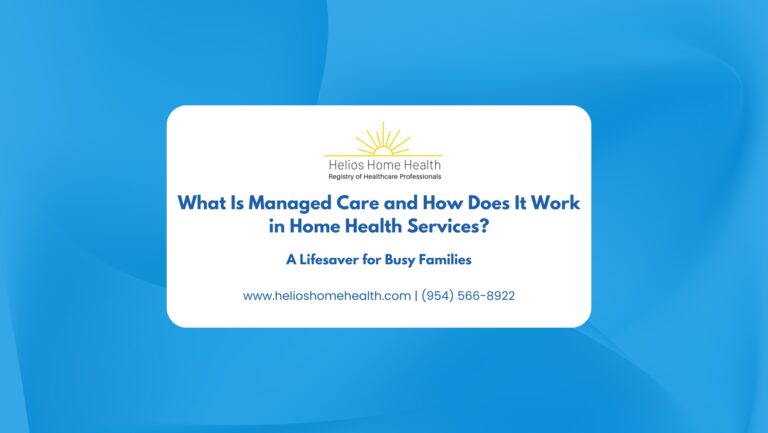
What Is Managed Care and How Does It Work in Home Health Services?
When families begin searching for support, one of the most confusing terms they come across is managed care in home health services. While it may sound complicated, managed care is actually designed to simplify healthcare access, reduce costs, and improve the quality of care. Let’s break it down in plain language so you know exactly how it works, what to expect, and whether it’s right for you or your loved one.
Defining Managed Care in Simple Terms
At its core, managed care is a system where healthcare is coordinated through a network of providers. Instead of leaving patients to figure out coverage on their own, managed care plans connect them with approved doctors, nurses, and caregivers.
This approach helps control costs, prevents unnecessary treatments, and ensures patients receive appropriate care at the right time.
Think of it as having a guide who makes sure your healthcare journey is smoother, more affordable, and less overwhelming.
How Managed Care Connects With Home Health
When applied to home health care, managed care becomes especially valuable. Families don’t just need medical services; they need them delivered at home in a way that’s safe, consistent, and affordable.
Here’s how it usually works:
- You sign up for a managed care plan.
- The plan partners with a network of managed care providers who specialize in home health.
- A case manager helps coordinate services, matching them to your unique needs.
- The plan covers approved costs, which reduces surprise bills.
This structure makes home health care coverage more predictable and dependable.
Want to see how this looks in practice? Explore our Managed Care Services page for details.
A Real-Life Example
Consider this: Maria, a 72-year-old recovering from hip surgery, wanted to continue healing at home instead of in a facility. Through her managed care plan, she was connected with skilled nursing visits, physical therapy, and personal care support, all coordinated under one plan.
Her recovery was smoother, her daughter had peace of mind, and her family avoided unexpected costs. This is how managed care works in everyday life.
Advantages Families Notice With Managed Care
Families often ask, “What’s the real value of managed care for us?” The answer lies in both savings and support.
1. Cost Control That Eases the Burden
Managed care reduces out-of-pocket expenses by negotiating rates with providers, making care more affordable without compromising quality.
2. One Plan, Coordinated Services
Instead of juggling multiple providers, you have one structured plan ensuring all services, from nursing care to therapy, work in sync.
3. Improved Health and Fewer Setbacks
Because providers must follow care guidelines, patients often experience better outcomes, fewer hospitalizations, and smoother recovery.
4. Less Stress for Loved Ones
Families can shift their focus from managing paperwork to focusing on comfort and well-being.
Things to Watch Out for in Managed Care
Managed care also has some limitations that families should be aware of:
- Restricted provider choice: Most plans limit you to in-network providers.
- Pre-approvals required: Some services need authorization first, which may cause delays.
- Coverage limits: Not every type of care is included, so it’s vital to review details carefully.
Even with these challenges, many households find that the overall structure and benefits of managed care outweigh the drawbacks.
Who Is Managed Care Designed to Help Most?
Managed care is particularly helpful for:
- Seniors who need consistent support at home.
- Patients managing chronic conditions like heart disease or diabetes.
- Families looking for reliable home health care coverage.
- Individuals recovering after surgery who need temporary skilled care.
By offering structured coordination, managed care ensures people receive the right level of support when they need it most.
Tips for Picking the Right Managed Care Plan
If you’re considering managed care, here’s what to evaluate:
- Network size: Does the plan include trusted local providers?
- Service coverage: Are essentials like personal care or companion care included?
- Flexibility: How much choice do you have in scheduling or selecting caregivers?
- Support systems: Does the plan provide a care coordinator to guide you?
Take time to compare plans before committing. The right choice should balance affordability, accessibility, and support.
Services That Often Fall Under Managed Care
Managed care isn’t just about financial coverage; it’s about connecting you with the right type of care. Depending on your needs, plans may include:
- Skilled Nursing Care for advanced medical needs at home.
- Memory Care for those living with Alzheimer’s or dementia.
- Personal Care for daily living tasks such as bathing, grooming, and meal support.
- Companion Care for social interaction and companionship.
These services are designed to maintain independence and improve day-to-day comfort.
Final Word: Making Managed Care Work for Your Family
Understanding managed care in home health services doesn’t have to feel overwhelming. At its core, managed care is about balance, providing affordable access while ensuring patients receive attentive, personalized support.
For families, this means less stress, more coordinated care, and confidence in the future.
If you’re ready to explore how managed care can help, visit our Managed Care page to get started today.
Frequently Asked Questions
Is managed care the same as health insurance?
Not exactly. Health insurance covers medical costs broadly, while managed care coordinates services through a provider network to improve quality and reduce costs.
Does managed care cover personal home care?
Many plans include personal care, such as help with bathing, dressing, or meal preparation, but it’s best to confirm with your provider.
What’s the biggest advantage of managed care in home health?
The biggest benefit is coordination; services are streamlined under one plan, which saves time, lowers costs, and improves outcomes.
